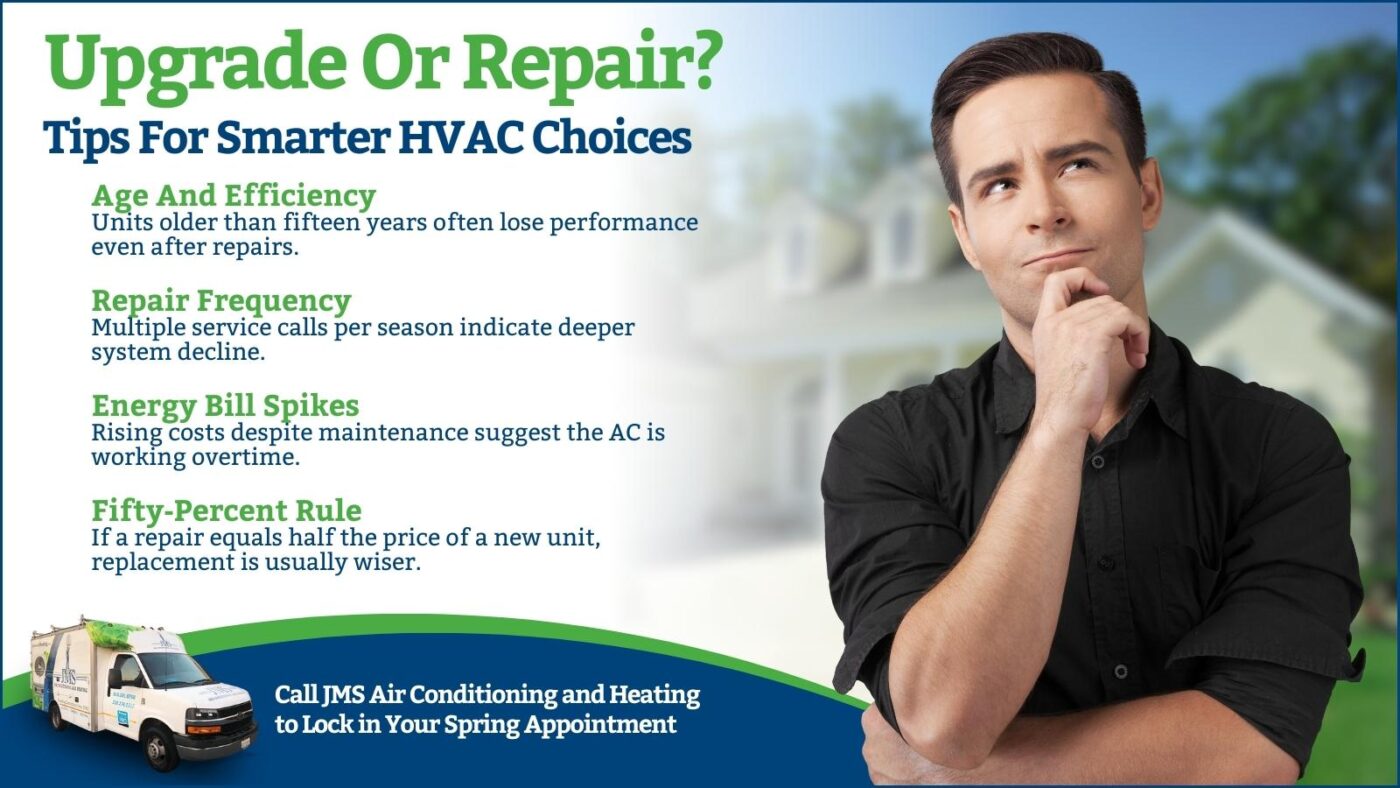When your air conditioning system starts acting up in Houston’s sweltering heat, you’re faced with a critical decision that can impact your comfort and wallet for years to come. Should you invest in repairing your current system or bite the bullet and replace it entirely? This decision affects thousands of Houston homeowners annually, with the average household spending between $300-$5,000 on HVAC services each year according to the Department of Energy.
The choice between residential AC repair and replacement isn’t always straightforward. Factors like system age, repair frequency, energy costs, and long-term reliability all play crucial roles in determining the most cost-effective path forward. Making the wrong decision can lead to recurring breakdowns, skyrocketing energy bills, and unexpected expenses during Houston’s most demanding summer months.
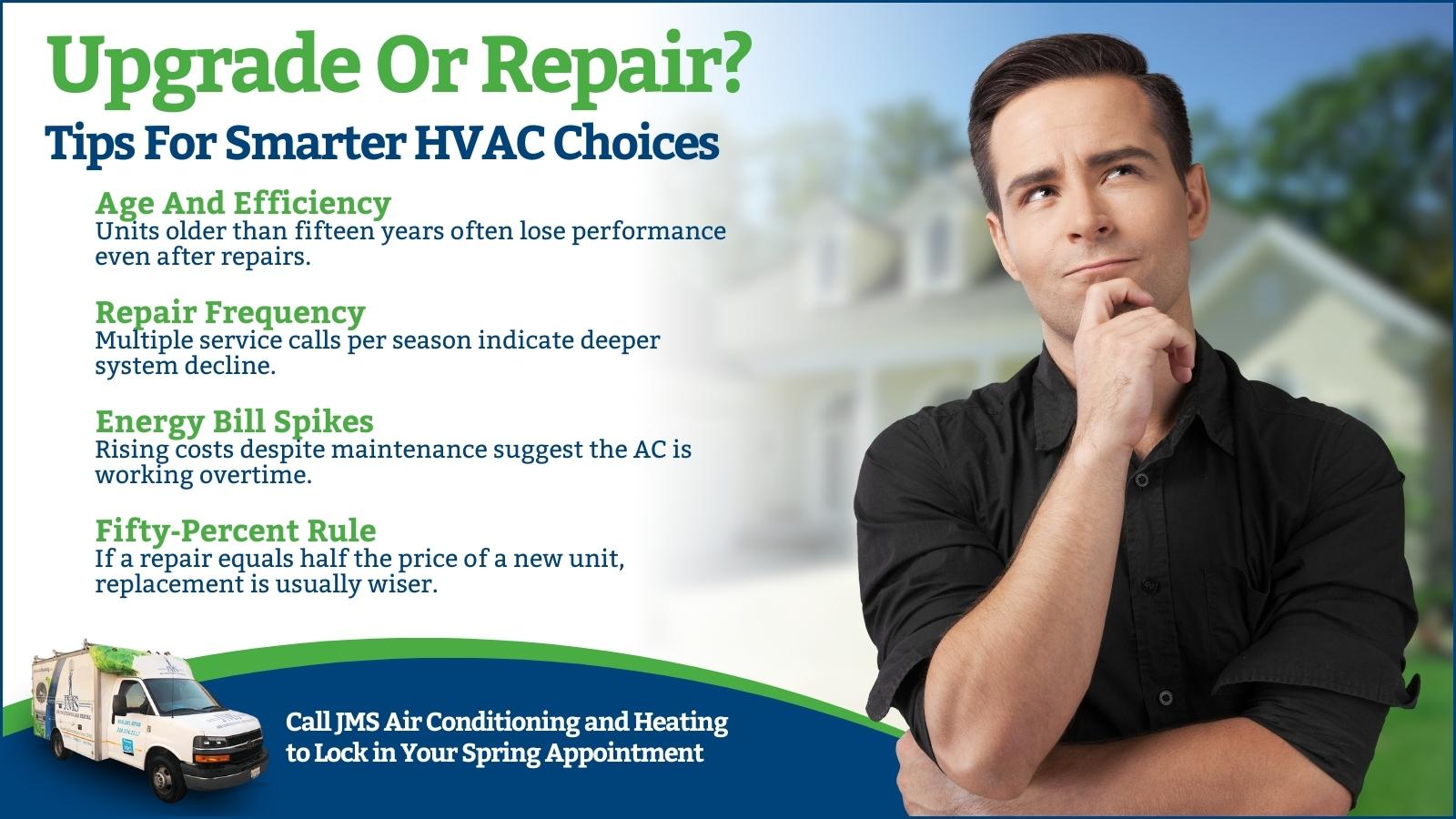
Understanding When to Repair vs Replace Your Residential AC
The decision between AC repair and AC replacement hinges on several critical factors that experienced HVAC professionals evaluate during system assessments. Understanding these factors empowers homeowners to make informed decisions that align with their budget and long-term comfort needs.
The 50% Rule for AC Repair Decisions
HVAC professionals commonly use the “50% rule” as a baseline for repair versus replacement decisions. If the cost of repairs exceeds 50% of the replacement cost for a system that’s over 10 years old, replacement typically makes more financial sense. For a Houston home with a system valued at $6,000, repairs costing more than $3,000 would trigger serious replacement consideration.
However, this rule should be applied alongside other factors like energy efficiency, reliability, and the system’s remaining lifespan. A 12-year-old system requiring $2,500 in repairs might seem like a reasonable fix, but if it’s likely to need additional major repairs within two years, replacement becomes the smarter investment.
System Age and Expected Lifespan
According to the Air Conditioning, Heating, and Refrigeration Institute (AHRI), residential AC systems typically last 15-20 years with proper maintenance. However, Houston’s extreme climate and high usage patterns can reduce this lifespan to 12-15 years for many systems.
- 0-5 years: Repairs almost always make sense, often covered by warranty
- 5-10 years: Evaluate repair costs against system efficiency and reliability
- 10-15 years: Consider replacement if facing major component failures
- 15+ years: Replacement typically recommended unless minor repairs needed
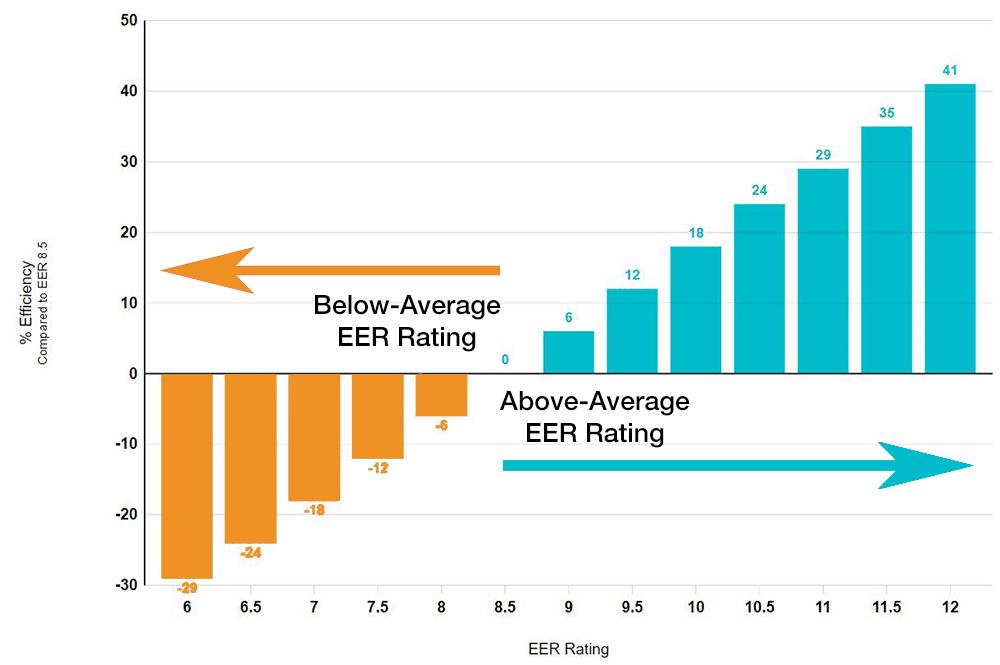
Cost Analysis: Repair vs Replacement Financial Impact
Understanding the true cost of AC repair versus replacement extends beyond the initial investment. Houston homeowners must consider immediate costs, long-term expenses, energy efficiency impacts, and potential rebates or financing options available for new systems.
Immediate Costs Breakdown
Common residential AC repairs in Houston range significantly based on the component requiring attention:
| Repair Type | Average Cost Range | Replacement Alternative | Replacement Cost Range |
|---|---|---|---|
| Refrigerant Leak Repair | $200-$1,500 | New AC System | $4,000-$8,000 |
| Compressor Replacement | $1,500-$2,500 | New AC System | $4,000-$8,000 |
| Evaporator Coil Replacement | $1,000-$2,000 | New AC System | $4,000-$8,000 |
| Condenser Unit Replacement | $1,500-$3,000 | New AC System | $4,000-$8,000 |
Long-Term Financial Considerations
While repair costs appear lower initially, the long-term financial picture often favors replacement for aging systems. A 2023 study by Energy Star found that homeowners replacing 10+ year old systems saved an average of $200-$400 annually on energy costs with new high-efficiency units.
“We regularly see Houston homeowners spending $1,200-$2,000 annually on repairs for systems over 12 years old,” explains Sarah Johnson, certified HVAC technician with over 15 years of experience. “These same homeowners could invest in a new system and eliminate repair costs while reducing their energy bills by 20-40%.”
Age and Efficiency Factors in Your Decision
The age of your residential AC system directly correlates with its efficiency and reliability. Understanding how system age affects performance helps homeowners make data-driven decisions about repair versus replacement investments.
SEER Rating Evolution and Energy Savings
Seasonal Energy Efficiency Ratio (SEER) ratings have improved dramatically over the past two decades. Systems installed before 2006 typically operate at 8-10 SEER, while current minimum standards require 14 SEER, with high-efficiency systems reaching 20+ SEER.

For a typical 2,000 square foot Houston home, upgrading from a 10 SEER to 16 SEER system can reduce annual cooling costs by $300-$500, according to the Department of Energy. This translates to $3,000-$5,000 in savings over a 10-year period, often offsetting the replacement cost difference.
Performance Degradation Over Time
Even well-maintained AC systems experience performance degradation as components wear out. Key indicators of declining efficiency include:
- Increasing energy bills despite consistent usage patterns
- Longer cooling cycles to reach desired temperatures
- Uneven temperature distribution throughout the home
- More frequent repair needs and service calls
- Difficulty maintaining humidity levels during peak summer months
Common Repair Issues vs Replacement Indicators
Certain AC problems signal repair opportunities, while others indicate it’s time for system replacement. Understanding these distinctions helps homeowners avoid throwing good money after bad on systems approaching end-of-life.
Repairable Issues Worth Addressing
Some residential AC problems are cost-effective to repair, especially on newer systems:
- Thermostat malfunctions: $150-$400 repair cost, significant comfort improvement
- Clogged condensate drains: $100-$200 fix preventing water damage
- Worn fan belts or motors: $200-$600 repair extending system life
- Dirty or frozen coils: $150-$300 cleaning/repair improving efficiency
- Electrical connection issues: $200-$500 repair preventing safety hazards
Red Flags Indicating Replacement Need
Certain problems suggest system replacement offers better value than continued repairs:
- Multiple simultaneous failures: When compressor, coils, and ductwork all need attention
- Refrigerant leaks in older systems: Especially units using R-22 refrigerant being phased out
- Frequent breakdown patterns: Three or more major repairs within 12 months
- Inability to maintain temperature: System running constantly without reaching set temperature
- Rising energy costs: Monthly bills increasing 15-20% year over year
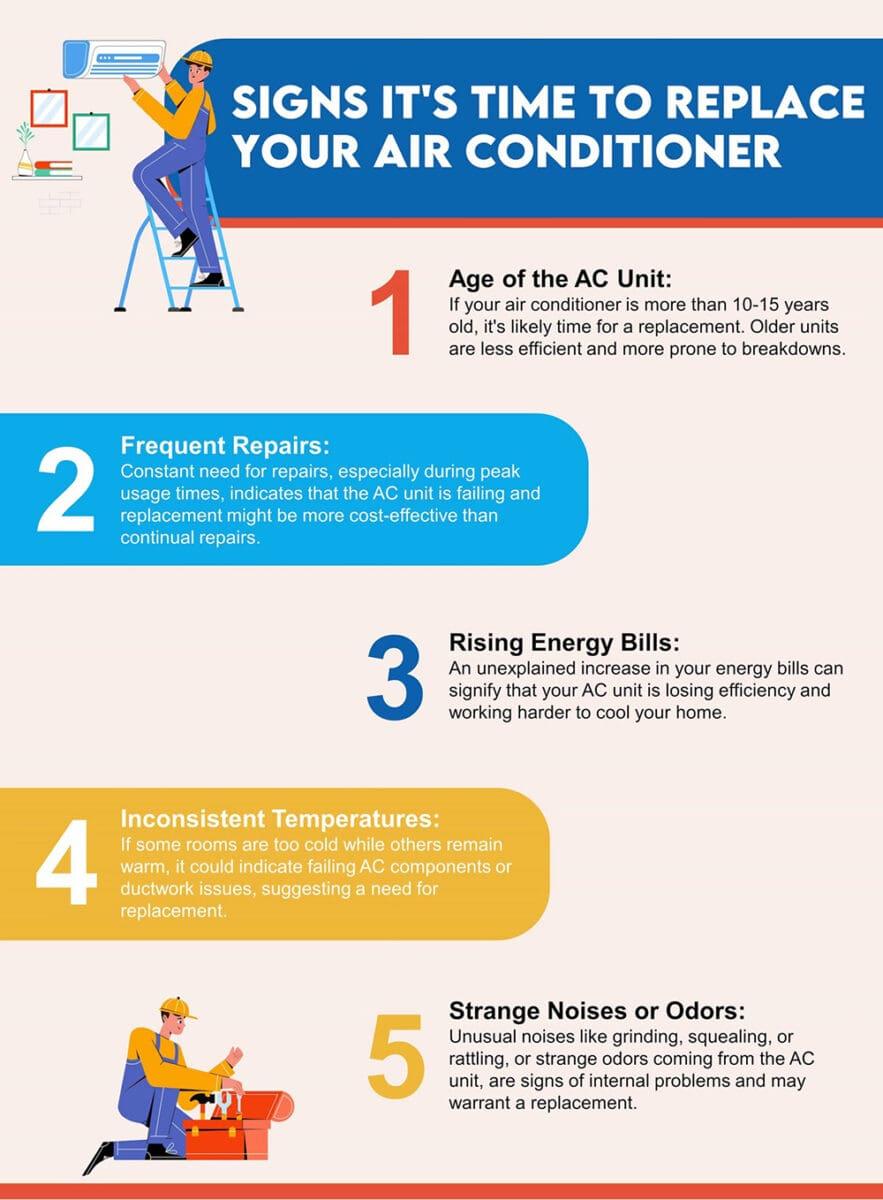
Energy Efficiency and Long-term Savings
Energy efficiency improvements in modern AC systems offer compelling financial incentives for replacement consideration. Houston’s extended cooling season amplifies these benefits, making efficiency gains particularly valuable for local homeowners.
Smart Technology Integration
Modern AC systems integrate with smart thermostats and home automation systems, providing unprecedented control over energy consumption. Features like variable-speed compressors, two-stage cooling, and advanced diagnostics optimize performance while reducing energy waste.
According to the Environmental Protection Agency, smart thermostat integration can reduce cooling costs by an additional 8-15% beyond SEER rating improvements. For Houston homeowners, this translates to $100-$250 in additional annual savings.
Rebates and Incentive Programs
Multiple rebate programs make AC replacement more financially attractive:
- Federal Tax Credits: Up to $2,000 for qualifying high-efficiency systems
- Utility Company Rebates: CenterPoint Energy offers rebates up to $1,200 for SEER 16+ systems
- Manufacturer Incentives: Seasonal promotions providing $500-$1,500 cash back
- Local Programs: City of Houston energy efficiency grants for qualifying homeowners
Making the Decision: Expert Guidelines
HVAC professionals use systematic approaches to guide homeowners through the repair versus replacement decision. These guidelines consider technical factors alongside financial implications to ensure optimal outcomes.
Professional Assessment Criteria
Certified technicians evaluate multiple factors during comprehensive system assessments:
| Assessment Factor | Repair Indicator | Replacement Indicator |
|---|---|---|
| System Age | Under 10 years | Over 12 years |
| Repair Cost | Under 30% of replacement cost | Over 50% of replacement cost |
| Energy Efficiency | SEER 13+ with good performance | SEER under 12 or declining performance |
| Repair Frequency | Infrequent issues, last repair over 2 years ago | Multiple repairs within 18 months |
| Refrigerant Type | R-410A or newer refrigerants | R-22 (Freon) systems |
Decision Matrix for Homeowners
“We recommend homeowners consider their total cost of ownership over the next five years,” advises Mike Rodriguez, master HVAC technician and energy efficiency specialist. “This includes repair costs, energy bills, and reliability factors that affect comfort and peace of mind.”
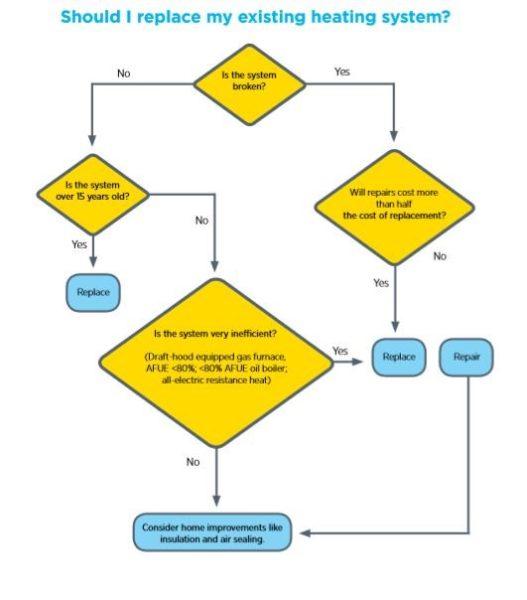
Houston-Specific Considerations
Houston’s unique climate and environmental factors influence AC repair versus replacement decisions. Understanding these local conditions helps homeowners make choices optimized for regional challenges.
Climate Impact on System Performance
Houston’s subtropical climate creates demanding conditions for AC systems:
- Extended cooling season: 8-9 months of AC usage annually
- High humidity levels: Increased strain on system dehumidification
- Extreme temperature fluctuations: Systems cycling frequently during shoulder seasons
- Storm-related power issues: Electrical surges affecting system components
Local Contractor Considerations
Houston’s competitive HVAC market offers advantages for both repair and replacement services. Professional AC repair services in Houston typically provide:
- 24/7 emergency repair availability during peak summer months
- Competitive pricing due to market competition
- Specialized expertise with high-humidity climate challenges
- Access to latest energy-efficient replacement systems
Professional Assessment: Why It Matters
Attempting to diagnose AC problems without professional expertise often leads to incorrect repair versus replacement decisions. Professional assessments provide comprehensive system evaluations that consider factors invisible to untrained observers.
Comprehensive System Analysis
Professional technicians perform detailed evaluations including:
- Refrigerant pressure testing to identify leak locations and severity
- Electrical system analysis checking connections, capacitors, and motor function
- Airflow measurement ensuring proper circulation and duct integrity
- Heat exchanger inspection identifying safety concerns and efficiency issues
- Control system testing verifying thermostat and safety device operation
Long-term Reliability Predictions
Experienced technicians can predict likely failure patterns based on system condition and age. This foresight helps homeowners avoid surprise breakdowns and plan maintenance investments strategically.
“A thorough inspection reveals not just current problems, but potential issues developing over the next 12-24 months,” explains Jennifer Liu, certified NATE technician specializing in residential systems. “This information is crucial for making informed repair versus replacement decisions.”
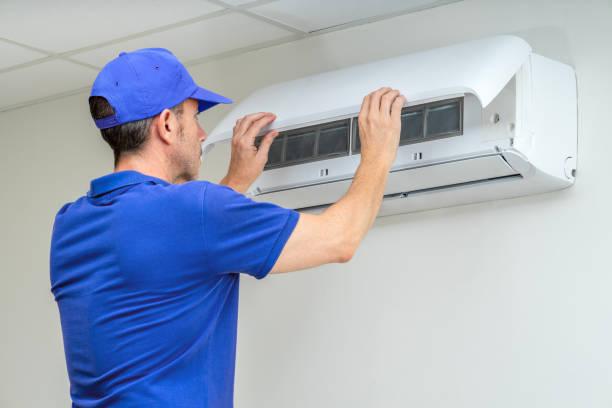
Conclusion: Making the Right Choice for Your Home
The decision between residential AC repair and replacement requires careful consideration of multiple factors including system age, repair costs, energy efficiency, and long-term reliability needs. While repair makes sense for newer systems with isolated problems, replacement often provides better value for aging systems requiring major component replacements.
Key takeaways for Houston homeowners include understanding the 50% rule, evaluating total cost of ownership over 5+ years, and considering energy efficiency improvements available in modern systems. Professional assessment provides crucial insights that help avoid costly mistakes and ensure optimal comfort and efficiency.
Remember that Houston’s demanding climate accelerates system wear, making proactive maintenance and timely replacement decisions essential for maintaining reliable comfort. Energy efficiency improvements in modern systems, combined with available rebates and incentives, often make replacement more financially attractive than continued repairs on aging equipment.
Get Expert Guidance on Your AC Decision
Don’t let AC problems disrupt your Houston home’s comfort. Our certified technicians provide comprehensive system assessments to help you make the right repair versus replacement decision.
Call (713) 598-2737 for your free consultation and detailed estimate today.
Frequently Asked Questions
How do I know if my AC needs repair or replacement?
Consider replacement if your system is over 12 years old, requires repairs costing more than 50% of replacement value, or has needed multiple major repairs within 18 months. Systems with SEER ratings below 12 or using R-22 refrigerant typically benefit from replacement.
What’s the average cost difference between AC repair and replacement in Houston?
Major AC repairs range from $1,000-$3,000, while replacement systems cost $4,000-$8,000. However, new systems offer 20-40% energy savings and eliminate ongoing repair costs, often providing better long-term value.
How long do AC systems typically last in Houston’s climate?
Houston’s demanding climate typically reduces AC system lifespan to 12-15 years, compared to the national average of 15-20 years. Proper maintenance can extend system life, but replacement should be considered around the 12-year mark.
Are there rebates available for AC replacement in Houston?
Yes, multiple rebate programs are available including federal tax credits up to $2,000, CenterPoint Energy rebates up to $1,200 for high-efficiency systems, manufacturer incentives, and local energy efficiency programs.
Should I repair my AC if it uses R-22 refrigerant?
R-22 refrigerant is being phased out, making it expensive and difficult to obtain. Systems using R-22 typically benefit from replacement with newer systems using R-410A refrigerant, which is more efficient and environmentally friendly.
How can I improve my AC’s efficiency without full replacement?
Consider upgrading to a smart thermostat, improving ductwork sealing, enhancing indoor air quality with better filtration, and maintaining regular AC maintenance schedules.

